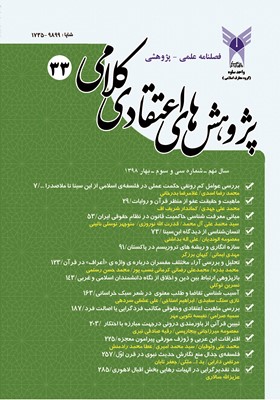انسان شناسی از دیدگاه ابن سینا
محورهای موضوعی : کلام اسلامیمعصومه الوندیان 1 * , علی اله بداشتی 2
1 - دانشگاه قم
2 - دانشگاه قم
کلید واژه: انسانشناسی, عقل, نفس, ابن, سینا. ,
چکیده مقاله :
تفکر انسان قدمتی به درازاي حیات بشر دارد. یکی از مسایل اصلی انسان از همان آغاز، پرسش از خود و شرایط پیرامونی بوده است. حکما و متکلمان دینی در دوره های گوناگون، از اقصی نقاط دنیا، در مورد ابعاد مختلف انسان، نظریه پردازی های بسیاری نموده اند. از این میان می توان ابن سینا را نام برد که آرای فلسفی او تاثیر بسزایی در اندیشمندان دیگر داشته است. اين پژوهش با روش توصيفي- تحليلي، با مطالعه عمده مباحث شیخ الرئیس در علم-النفس، در کتب فلسفي اش همچون شفا، نجات و اشارات و تنبیهات در مراتب انسان شناسي، به تبيين و بررسي انديشه هاي او در باب انسان پرداخته و انسان شناسی را در دو مرتبه و دو مرحله بررسی می کند: مرحله اول، فلسفي و نظري محض است که در آن به انسان و ابعاد وجودي او، با دیدگاهی عقلي و فلسفي نگريسته می شود؛ مرحله دوم که نقطه اوج انسان-شناسي اوست، مرحله اشراقي و شهودي است. او در رسائل عرفاني خود همچون رساله حي ابن يقظان، رساله الطير و سلامان و ابسال، و در نمط هاي آخر اشارات و تنبيهات و خطوطی از کتاب مباحثات و کتاب شفا، با نگرشي اشراقي و عرفاني، به بحث از انسان پرداخته است.
Human thinking has a long history of human life. One of the main human issues from the very beginning was the question of itself and the surrounding environment. Religious scholars and religious theologians have made many theories about different aspects of human life in different periods, from all over the world. Among these would be Ibn-e Sina, whose philosophical opinions had a tremendous impact on other scholars. This research is based on descriptive-analytic method, with the study of the topics of Sheikh Al-Rais in the sciences, in his philosophic books such as healing, salvation, hints and punishments in the fields of humanities, to explain his thoughts on human life. He examines humanity in two stages and two stages: the first stage is pure philosophical and theoretical, In which he looks at the human being and his existential dimensions with a rational and philosophical view; the second stage, which is the culmination of his anthropology, is the stage of enlightenment and intuition. In his mystical rhetoric, such as Haye Ibn Yaghazan, Al-Tha'ir, Salam and Abbasal, and in the final sentences of hints and punishments and lines from the book of discussions and the book of healing, with an illogical and mystical view, he has discussed the human.
ابن¬سینا، حسین¬بن¬عبداله (1375)؛ الاشارات و التنبیهات، جلد اول، ترجمه و شرح حسن ملکشاهی، تهران.
ابن¬سینا، حسین¬بن¬عبداله (1357)؛ النجاة، مطبعه السعاده بجوار محافظة، مصر: المکتبه المرتضوی.
ابن¬سینا، حسین¬بن¬عبداله (1388)؛ الشفا، ترجمه و شرح محمدحسین ناییجی، قم: انتشارات موسسه امام خمینی، چاپ دوم.
ابن¬سینا، حسین¬بن¬عبداله (1392)؛ الشفا، ترجمه و شرح محمدحسین ناییجی، قم: انتشارات موسسه امام خمینی، چاپ دوم.
ابن¬سینا، حسین¬بن¬عبداله (1389)؛ شواهد الربوبیه، ترجمه و تفسیر جواد مصلح، تهران: انتشارات سروش، چاپ پنجم.
الله بداشتی، علی(1389)؛ انسان شناسی صدرالمتألهین، فصلنامه پژوهش¬های فلسفی – کلامی، شماره 19.
داوودی، علی مراد (1387)؛ عقل در حکمت مشاء از ارسطو تا ابن¬سینا، تهران: انتشارات حکمت، چاپ اول.
ذبیحی، محمد(1392)؛ فلسفه مشاء با تکیه بر اهم آراء ابن¬سینا، تهران: انتشارات سمت، چاپ ششم.
ذبیحی، محمد(1388)؛ نقد و بررسی دیدگاه ابن سینا و ملاصدرا درباره چگونگی پیدایش نفس انسانی، فصلنامه علمی پژوهشی اندیشه نوین دینی، سال پنجم، شماره 6.
رحیم پور، فروغ السادات و زارع، فاطمه (1391)؛ نقد و بررسی دیدگاه ابن سینا و ملاصدرا درباره چگونگی پیدایش نفس انسانی، مجله آموزه¬های فلسفه اسلامی، شماره 10.
هاشمیان، احمد(1374)؛ علم النفس از دیدگاه دانشمندان اسلامی، تهران: دانشگاه پیام نور.

